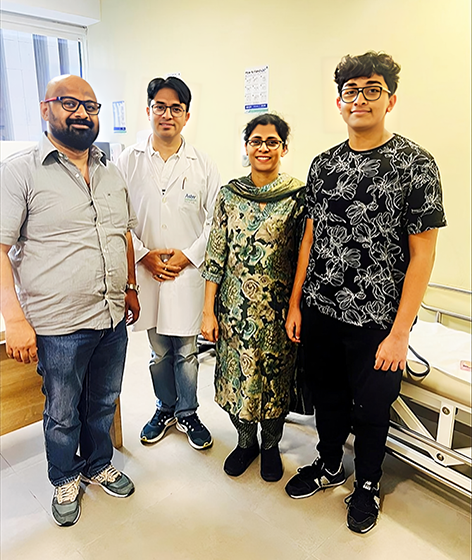Join In For A Memorable Third Week of DSS with Dazzling Retail Offers and Raffles
A 46-year-old patient with rare autoimmune nerve disease – CIDP treated successfully at Aster Hospital Sharjah

- Without treatment, 1 in 3 people with CIDP will need a wheelchair due to gradual worsening of symptoms[1]
- A disabling disease which leads to loss of strength and sensation, CIDP affects males twice as often as females and the average age of onset is 50.[2]
- Researchers estimate that there are 0.8 to 8.9 new cases of CIDP per 100,000 people in the United States each year.[3]
- The prevalence of CIDP may range from about 1 to 2 cases per 100,000 people to as high as 9 cases per 100,000 in some areas.[4]
Sharjah, UAE – May 13, 2024
Aster Hospital Sharjah recently helped a 46-year-old school teacher regain control of her life and career through successful treatment of Chronic Inflammatory Demyelinating Polyneuropathy (CIDP), a rare autoimmune disorder, which was leading to loss of physical strength and sensation.
Mrs. Annie Cherian’s journey began six months ago when she started experiencing weakness in all four limbs, making daily activities like standing up from a squatting position or combing her hair challenging. This gradual worsening of symptoms led her to seek medical attention at Aster Hospital Sharjah.
After thorough investigations and diagnosis by Dr. Rajesh Chaudhary, Specialist Neurologist at Aster Hospital Sharjah, Mrs. Cherian was diagnosed with CIDP, a condition that affects approximately 1-2 per 100,000 people annually.4 CIDP is characterized by sensory loss, weakness, and loss of reflexes due to nerve damage. A rare autoimmune disorder, CIPD affects the peripheral nerves and may occur with other conditions like diabetes, chronic hepatitis, IBD, cancer among others. Basic symptoms can include problems in walking due to lack of strength, loss of sensation, trouble using arms and legs, sense of tingling or pain among others.[5]
Dr. Rajesh Chaudhary, Specialist Neurologist at Aster Hospital Sharjah explained, ” CIDP presents unique treatment dilemmas, particularly when co-existing with conditions such as diabetes mellitus. In Mrs. Cherian’s case, we had to carefully weigh our treatment options. Steroids, a common choice in CIDP management, were not viable due to their potential to exacerbate her diabetic status. This led us to explore alternative therapies, ultimately opting for Intravenous Immunoglobulin (IVIG). While IVIG is highly effective in CIDP, its cost and monitoring requirements can pose significant challenges. Nevertheless, given its rapid relief potential and Mrs. Cherian’s positive response, IVIG emerged as the preferred treatment course.”
During her eight-day stay at Aster Hospital Sharjah, including five days in the ICU, Mrs. Cherian received IVIG treatment under careful monitoring. The treatment resulted in significant improvements, with Mrs. Cherian regaining strength in her limbs and being able to perform daily activities unassisted.
Autoimmune diseases are more prevalent in females, affecting one in every ten persons.1 Mrs. Cherian improved clinically and was discharged in stable condition with minimal weakness, which further improved during follow-up visits.
Expressing her gratitude, Mrs. Annie Cherian said, “I am incredibly thankful to Dr. Rajesh Chaudhary and the entire medical team at Aster Hospital Sharjah. Their expertise and care not only helped me recover remarkably and restore my strength but also made me aware of autoimmune diseases’ impact and the importance of timely medical intervention. Aster Hospital Sharjah’s dedication to patient care is commendable, and I thank them for giving me my life back.”
Dr. Chaudhary further elaborated on IVIG’s mechanism and outcomes, stating, “IVIG enters the circulation and binds to already existing antibodies against self-tissue, neutralizing them. Despite the difficulty in predicting IVIG’s results and the potential need for repetitive doses, Mrs. Cherian’s case demonstrated its efficacy. By the end of the five-day IVIG regimen, she showed remarkable stability and improvement, regaining upper limb strength and achieving independence in daily activities. Such outcomes highlight IVIG’s role as a cornerstone in CIDP management, albeit with considerations like cost, allergic reactions, and kidney effects that necessitate vigilant monitoring.”
Mrs. Cherian’s successful treatment at Aster Hospital Sharjah highlights the hospital’s commitment to delivering advanced medical care and raising awareness about rare diseases like CIDP.
Researchers estimate that there are 0.8 to 8.9 new cases of CIDP per 100,000 people in the United States each year.3 This range is wide because CIDP can affect people in many different ways and is difficult to diagnose because of this. CIDP warrants early recognition and treatment, when appropriate. Left untreated, 30 percent of CIDP patients will progress to wheelchair dependence.[6] Early recognition and proper treatment can avoid a significant amount of disability. Long term, relapses are expected, but remission is also possible. CIDP is a rare disorder that can affect any age group, and the onset of the
disorder may begin during any decade of life. CIDP affects males twice as often as females, and the average age of onset is 50.2
[1] https://www.hopkinsmedicine.org/health/conditions-and-diseases/chronic-inflammatory-demyelinating-polyradiculoneuropathy#:~:text=If%20they%20don’t%20seek,CIDP%20will%20need%20a%20wheelchair.
[2] https://www.csl.com/we-are-csl/vita-original-stories/2021/explainer-what-is-cidp
[3] https://www.ahdbonline.com/articles/treatment-patterns-and-costs-of-chronic-inflammatory-demyelinating-polyneuropathy-a-claims-database-analysis
[4] https://www.gbs-cidp.org/cidp/
[5] https://www.mountsinai.org/health-library/diseases-conditions/chronic-inflammatory-demyelinating-polyneuropathy#:~:text=Chronic%20inflammatory%20demyelinating%20polyneuropathy%20(CIDP,system%20includes%20all%20peripheral%20nerves.
[6] https://www.uofmhealth.org/conditions-treatments/brain-neurological-conditions/guillain-barre-syndrome-GBS-and-chronic-inflammatory-demyelinating-polyneuropathy-CIDP







